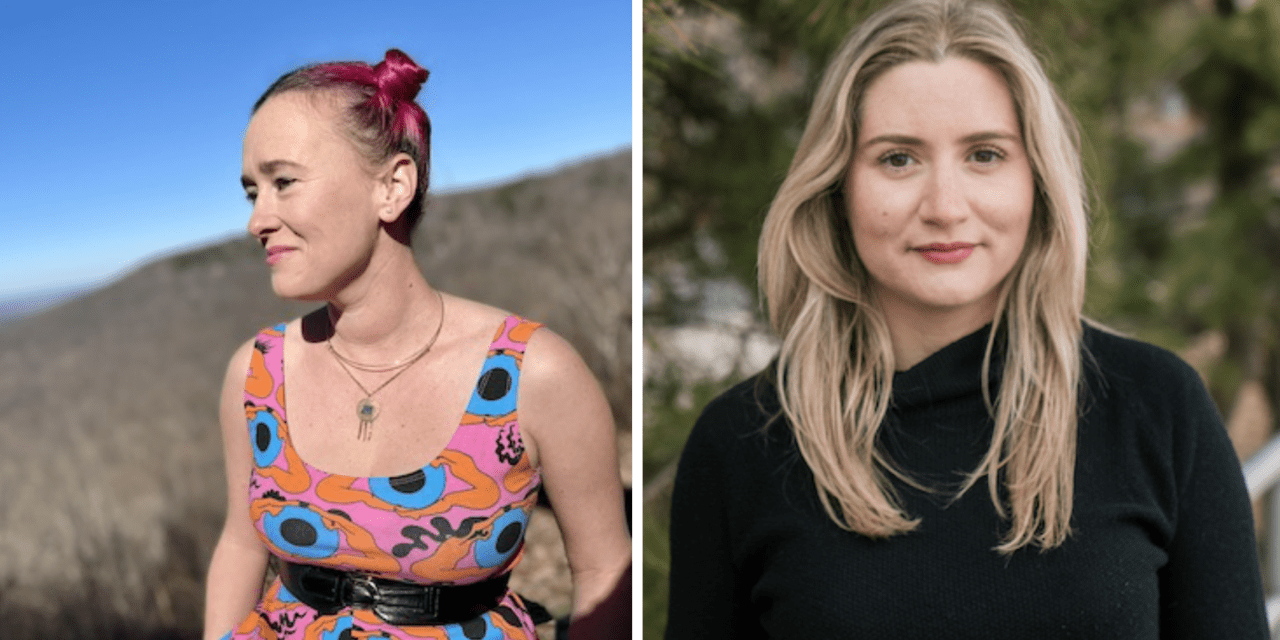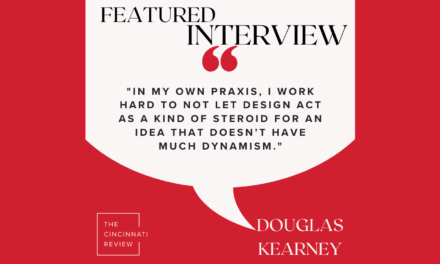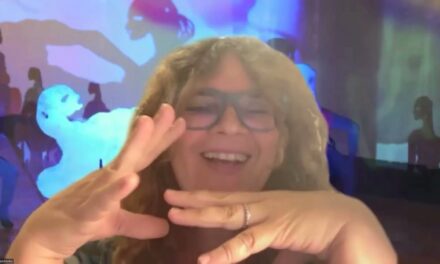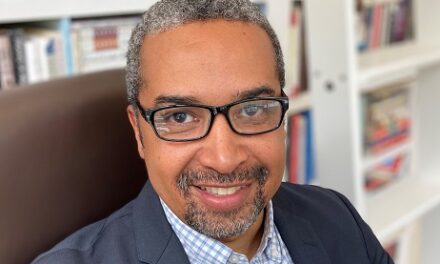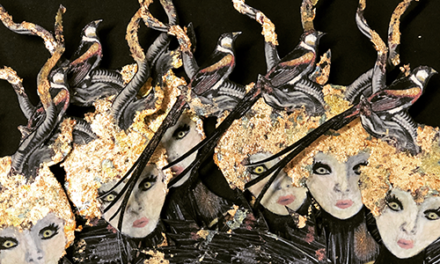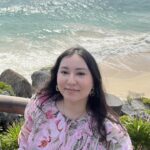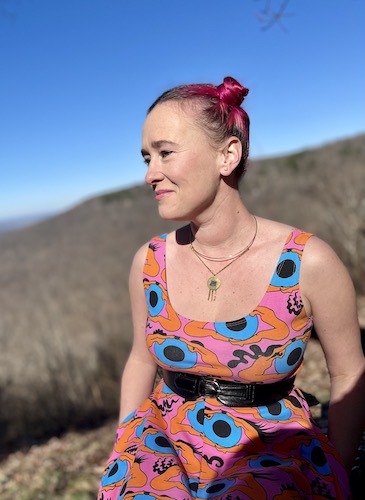
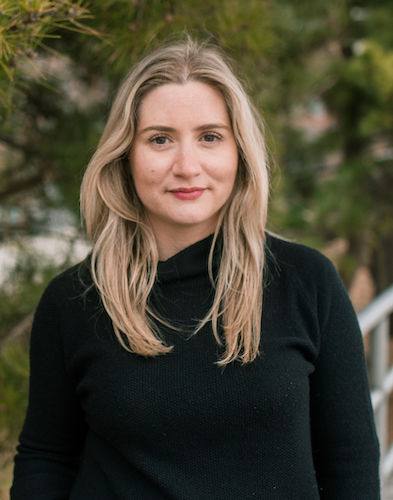
Assistant Editor Haley Crigger: The Robert and Adele Schiff Fiction Festival kicks off today! This evening’s event, held in the Elliston Poetry Room at 5:30 PM, will feature readings from Gwen Kirby and Liv Stratman. (If you’d like to tune in remotely, you can also register via Zoom.)
As accomplished authors and graduates of UC’s creative writing doctoral program, they are uniquely familiar with the writer’s life in all its forms: a solitary practice, an academic field, a community, an industry, an impulse. Over email, I asked them how they wade these waters and continue to forge a sense of artistic purpose:
In a society that often undervalues art, institutional support is crucial to any artist’s development and success. Fiction writers may find this in the form of artist’s grants, MFA programs, and / or residencies. In describing the formation of her book, Bess Winter mentioned that Michael Griffith’s full investment in her academic interests provided her the “seriousness of purpose and validation” she needed while pursuing her PhD at UC.
That got me thinking about writers’ other sources of validation. When external support is less consistent, where do you find that seriousness of purpose? How do you find it? What convictions, rituals, people, or places do you turn to?
Kirby: I think the biggest source of validation for me is reading a new-to-me book and feeling seen and spoken to by it. Of course, I rely heavily on my fellow writers to get through the days (and weeks and years) it takes to write a book. The close friends I made while at Cincinnati are now my rocks, reminding me why I love to create even when it’s going terribly, making me laugh, sharing their own triumphs and struggles. But when I get caught up asking, “what is the point of all of this? It isn’t fixing global warming or curing COVID. It’s just me making up shit in my room,” then I turn to the books I love, which also didn’t fix global warming or stop World War I. But they do make me feel more human. They bring me joy and hope. And when I read a new book and that feeling of connection happens, I know that what we do when we make art is important. If I can be a part of it, if I can make another person, a total stranger, feel that, well, that’s worth striving to accomplish.
***
Stratman: I think it’s always tricky, for artists, to find balance in how much importance they give their own work. Except for narcissists—and the arts do attract its share of them—making art, especially as a professional enterprise, takes a huge amount of faith in one’s own interests—interests that, for many others, are merely hobbies or private, even therapeutic practices. For me, my desire for other people to read and enjoy my fiction has always been hugely embarrassing. It can feel childish, or desperate, and of course there are all sorts of larger, much-gone-over questions about the usefulness of making art in the first place.
When I find myself anxious over these concerns, and therefore stalled or creatively blocked, I remind myself that I don’t have to write. I write because even in the periods of my life where I haven’t been writing—either because I lack confidence or I’m too busy trying to make money or I just don’t feel like writing—I am still making up stories, and getting ideas, and I find this habit entertaining, and in some way satisfying, even if only for myself. That isn’t to suggest that I think of myself as gifted, or that I believe myself to be spiritually called to a life as a writer; I think of myself as a normal person who happens to be a little whimsical and day-dreamy in a way that lends itself to the habit of writing.
I also love to read, and every time I read a really wonderful book, I can suspend all my practical concerns about the why of it all. Perhaps I am essentially a selfish person who doesn’t care about being useful? I think writers who are struggling with the loneliness of the work, or the anxiety that comes from lack of, as you say, external support, might take some comfort by reminding themselves that the people in our society who have the most support—institutional, financial, in the form of media attention, or otherwise—are not necessarily very good! I don’t concern myself with the fact that what I do is valued less than what businessmen and lawyers and doctors and politicians and real estate brokers and, oh, say, industrial meat manufacturers do, because I don’t want to do any of that shit. What’s more, you notice people out of Silicon Valley—people with so much support—constantly attempting to convince the rest of us of the great, world-changing importance of their innovations and interests. Whether we believe them initially or not, a lot of these guys turn out to be liars, frauds, extortionists, democracy ruiners, right? It therefore doesn’t seem like such a bold move, as I’ve gotten older, to believe the stories I make up should have a place on the shelves of a few generous readers. I’ve learned to give myself a break.
Gwen E. Kirby is the author of the debut collection Shit Cassandra Saw (Penguin Random House, 2022). She has an MFA from Johns Hopkins University and a PhD from the University of Cincinnati. Her stories appear in One Story, Tin House, Guernica, Mississippi Review, Ninth Letter, SmokeLong Quarterly, and elsewhere. Currently, she is the associate director of programs and finance for the Sewanee Writers’ Conference at the University of the South, where she also teaches creative writing.
Liv Stratman holds a BA and MA from the University of Cincinnati, and an MFA from the University of Wisconsin-Madison. Her first novel, Cheat Day, was released by Scribner in 2021. She lives in Long Island, New York.

